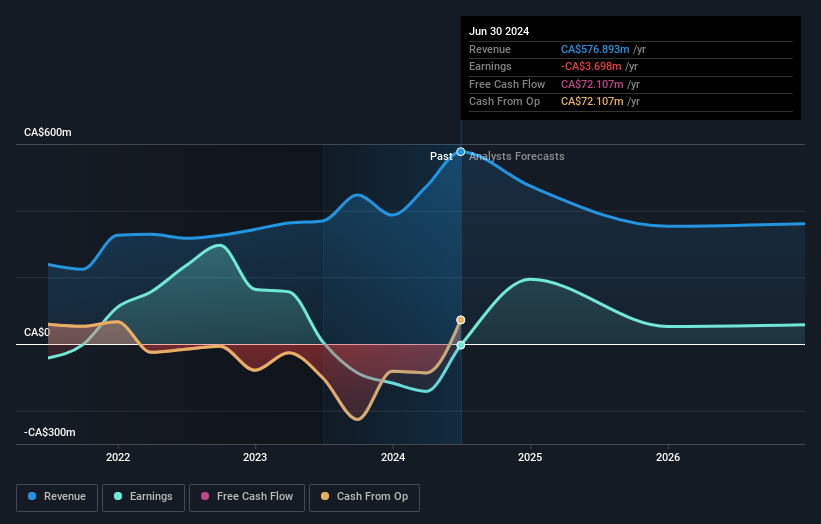If you want to compound wealth in the stock market, you can do so by buying an index fund. But if you pick the right individual stocks, you could make more than that. For example, the Dream Unlimited Corp. (TSE:DRM) share price is up 89% in the last 1 year, clearly besting the market return of around 27% (not including dividends). That’s a solid performance by our standards! The longer term returns have not been as good, with the stock price only 3.7% higher than it was three years ago.
So let’s investigate and see if the longer term performance of the company has been in line with the underlying business’ progress.
See our latest analysis for Dream Unlimited
Given that Dream Unlimited didn’t make a profit in the last twelve months, we’ll focus on revenue growth to form a quick view of its business development. Shareholders of unprofitable companies usually desire strong revenue growth. Some companies are willing to postpone profitability to grow revenue faster, but in that case one would hope for good top-line growth to make up for the lack of earnings.
In the last year Dream Unlimited saw its revenue grow by 56%. That’s stonking growth even when compared to other loss-making stocks. The solid 89% share price gain goes down pretty well, but it’s not necessarily as good as you might expect given the top notch revenue growth. If that’s the case, now might be the time to take a close look at Dream Unlimited. Human beings have trouble conceptualizing (and valuing) exponential growth. Is that what we’re seeing here?
You can see below how earnings and revenue have changed over time (discover the exact values by clicking on the image).
Balance sheet strength is crucial. It might be well worthwhile taking a look at our free report on how its financial position has changed over time.
What About Dividends?
It is important to consider the total shareholder return, as well as the share price return, for any given stock. The TSR incorporates the value of any spin-offs or discounted capital raisings, along with any dividends, based on the assumption that the dividends are reinvested. So for companies that pay a generous dividend, the TSR is often a lot higher than the share price return. We note that for Dream Unlimited the TSR over the last 1 year was 94%, which is better than the share price return mentioned above. This is largely a result of its dividend payments!
A Different Perspective
It’s nice to see that Dream Unlimited shareholders have received a total shareholder return of 94% over the last year. That’s including the dividend. That’s better than the annualised return of 12% over half a decade, implying that the company is doing better recently. Given the share price momentum remains strong, it might be worth taking a closer look at the stock, lest you miss an opportunity. While it is well worth considering the different impacts that market conditions can have on the share price, there are other factors that are even more important. To that end, you should learn about the 3 warning signs we’ve spotted with Dream Unlimited (including 2 which are a bit unpleasant) .
Of course, you might find a fantastic investment by looking elsewhere. So take a peek at this free list of companies we expect will grow earnings.
Please note, the market returns quoted in this article reflect the market weighted average returns of stocks that currently trade on Canadian exchanges.
Have feedback on this article? Concerned about the content? Get in touch with us directly. Alternatively, email editorial-team (at) simplywallst.com.
This article by Simply Wall St is general in nature. We provide commentary based on historical data and analyst forecasts only using an unbiased methodology and our articles are not intended to be financial advice. It does not constitute a recommendation to buy or sell any stock, and does not take account of your objectives, or your financial situation. We aim to bring you long-term focused analysis driven by fundamental data. Note that our analysis may not factor in the latest price-sensitive company announcements or qualitative material. Simply Wall St has no position in any stocks mentioned.


